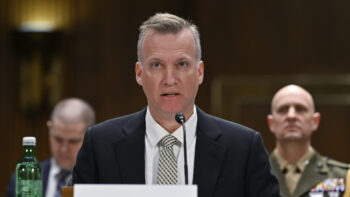
Rex Tillerson
WASHINGTON: If there’s one clear loser — aside from Rex Tillerson — in President Trump’s shakeup of his national security team it would appear to be the CIA.

Gina Haspel
Some will say that Trump’s appointment of Gina Haspel the CIA’s first female director, marks presidential confidence in the agency, since she is a career staff officer who was deputy director. But that’s not the view of a former senior intelligence officer. “By naming Gina, that shows me the CIA isn’t that important to President Trump,” the intelligence officer says. “They could have picked a much more high octane DCI.”
The most powerful CIA leaders, like the legendary Bill Casey, have all had their own power bases. They’ve also been trusted so much by the president that they could go in and tell him to his face when he’s wrong and not worry about political blowback. “Gina,” my source says, “is not going to do that.” In fact, “If you’re naming Gina, you don’t have big plans for the CIA.”
Haspel, whom the source describes as “very capable, very intelligent,” is a career staff officer who did one stint overseas as the chief of station in London. Her power base is the narrow one she has built during a relatively brief stint at deputy CIA director and a long career inside the agency.

Mike Pompeo
Her departing boss, Mike Pompeo, will take up Rex Tillerson’s mantle as Secretary of State. That is really good news for State since Pompeo appears to have Trump’s personal trust — in marked contrast to Tillerson, who foreign leaders could not rely on to accurately represent the president’s views, because he often didn’t know them and was not trusted by the president.
By contrast, Pompeo has regularly spent an hour personally presenting the Presidential Daily Briefing to Trump. Historically, the DCI will sometimes brief the president but will often hand that duty off to his deputy or to a senior Director of National Intelligence official. Pompeo clearly is trusted by Trump and the two men are much more alike in possessing outsize personalities. Both men are big and good at bluster.
As the United States begins to do the serious job of planning for the nuclear talks with North Korea, it’s crucial to have a Secretary of State, traditionally the single most important Cabinet officer. Having someone President Trump trusts in State, someone with his own power base who may be able to look the president in the face and tell him he’s wrong and why, could be a major improvement over Tillerson and a boost for interagency coordination.
One interesting view of Pompeo is that, the former senior intelligence officer says, he was co-opted by the senior career intelligence officers once he got to CIA. “There were high hopes for him among the alumni that he’d depoliticize and clean out the seventh floor (where the top CIA leaders have their offices). But once he went to Langley, he was recruited like George Tenet was by the staff.”

Sen. Dianne Feinstein
Democrats’ reaction to Tillerson’s firing — the first time a Cabinet member has been canned by tweet — was generally muted. Sen. Dianne Feinstein, the respected and tough senior Democrat on the Senate Intelligence and Judiciary committees, said she would have “many questions for Mike Pompeo relating to skill and competence in the diplomatic field. The CIA has little to do with diplomacy, and I believe any Secretary of State requires patience, diligence and above all knowledge and skill. This isn’t a role you can learn while on the job.”
You could argue whether Tillerson’s skills and knowledge as an inveterate international corporate leader stood him in good stead at State, where President Trump regularly undercut him. Pompeo has Trump’s trust, which seems to matter much more in this administration than does competence. Luckily, Pompeo is highly intelligent — first in his 1986 class at West Point — and is trusted by Trump.
Feinstein also raised what she called Haspel’s “connection” to the CIA’s torture program. However, the former senior intelligence source discounted those concerns, saying that Haspel was a staff officer at the time and neither participated nor made policy. My understanding is she administered the CIA site in Thailand where a great deal of the CIA torture occurred. Haspel has never testified publicly about her role in the torture program and some lawmakers want to make sure she declares her past role and future intentions.
Feinstein seemed to signal a relatively clear path ahead for the presumptive DCI, saying that, to the best of her “knowledge she has been a good deputy director and I look forward to the opportunity to speak with her again.” Later in the day, other Democrats raised questions about Haspel’s role in torture, as did Sen. John McCain, one of the few people on Capitol Hill who can speak with deep authority about torture. “Ms. Haspel,” McCain said in a statement, “needs to explain the nature and extent of her involvement in the CIA’s interrogation program during the confirmation process.”
McCain signaled to the Trump Administration what he would expect Haspel to do in order to win Senate approval: “Any nominee for director of the CIA must pledge without reservation to uphold this prohibition, which has helped us regain our position of leadership in the struggle for universal human rights.”
The turmoil in the administration is probably not over. The lessons from today’s actions are intriguing. Trump will fire anyone at any time and clearly does not care how the country or the world regards or reacts to his actions. The former intelligence officer noted that the Tillerson firing seems to cement the view that “Trump is a one-man show and he likes support from people around him.” That raises questions about how well the interagency process can be run when no one is sure what the policy is until the president tells them.
The usually laborious, careful and nuanced crafting of an administration’s national security and defense policies can fall victim to Trump’s whims at any time. While the president may believe that sort of chaotic approach, supplemented by his highly idiosyncratic policymaking by tweet, is authentic and marks him as a great leader, those who must implement those policies and are affected by them regularly express grave concerns about their effect.
Is National Security Advisor H.R. McMaster next?
Multi-ship amphib buy could net $900M in savings, say Navy, Marine Corps officials
Lawmakers gave the Navy authorities to ink a multi-ship amphib deal years ago, but the service has not utilized that power yet.


























